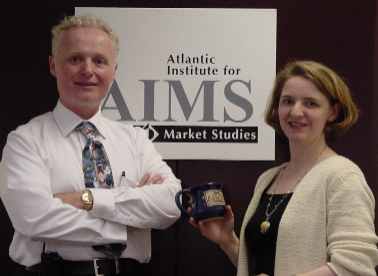Laura Jones at AIMS

If the British Columbia experience is any guide, Atlantic fisheries can avoid further ecological and economic disasters by pushing much further their adoption of a “property rights” style of management. Laura Jones, an economist from British Columbia, has just completed a study of ten BC fisheries and says fishery workers are virtually unanimous in their opinion that individual transferable quotas (ITQs) have improved their livelihood and in some cases, saved their fisheries from catastrophe.
Ms. Jones gave a talk at the Atlantic Institute for Market Studies offices outlining the benefits of ITQ based fisheries management over the more familiar practices of “effort based” or “command and control” type management, such as ever-shorter catching seasons and restrictions on equipment in order to try and control fishermen’s success at catching fish. The switch to “property rights” based management is cited, for example, as the primary reason the BC Halibut fishery has strengthened from the verge of collapse in the 1990s to a thriving, viable fishery in 2003.
Many Atlantic fisheries are still resisting the switch to property rights based management, arguing jobs are lost and big corporations buy up all the licences. “That argument doesn’t hold up.” said AIMS President, Brian Lee Crowley, “The Atlantic fisheries can’t last using the faulty management practices of the past. We have seen the results, fisheries wiped out and opportunity lost. These lessons from BC are an ecological and economic lifeline, and seem to confirm the positive experiences of those east coast fisheries that have adopted a property rights approach to management. But we still have far to go.”

